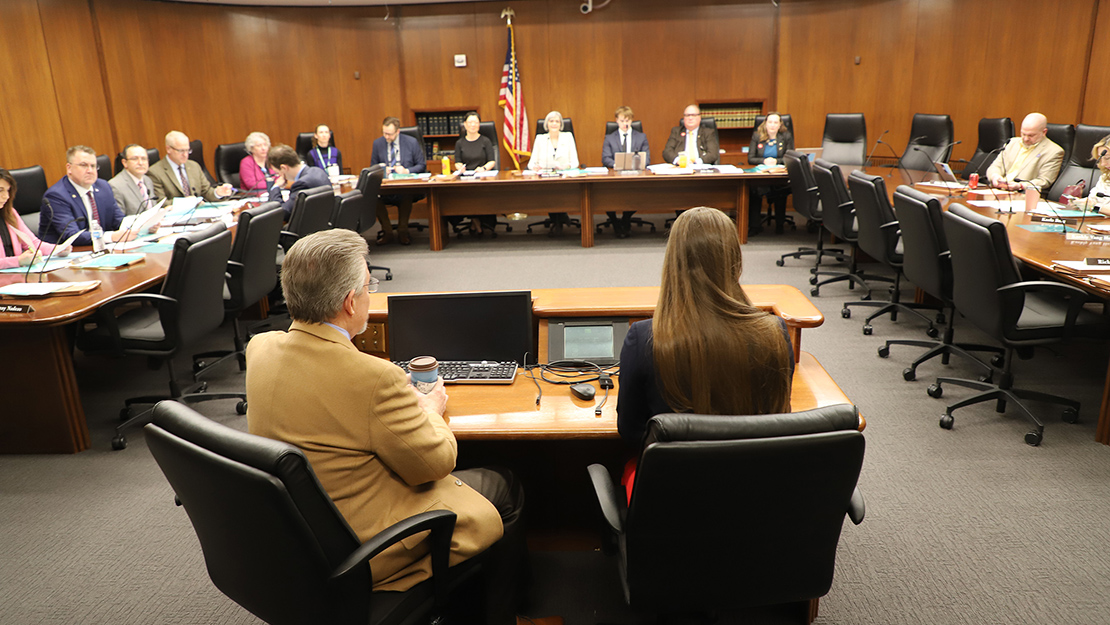Know the Minnesota American Legion Legislative Priorities

The 2024 Minnesota American Legion Legislative Priorities were approved by the Department Executive Committee in October at the Fall Conference in St. Cloud. They can be downloaded here: mnlegion.org/legislation.
Members of The American Legion are free to speak to their state legislators about these issues. Remember, the Legion is nonpartisan, but it does advocate for key veterans issues:
Minnesota American Legion Legislative Priorities
Below are the 2024 legislative priorities for the American Legion Department of Minnesota:
Pass the Veterans and Military Omnibus Bill
The 2023 session produced the second Veterans & Military Omnibus Bill, and this action to separate our legislation has become a Minnesota precedent. Let’s not step backward. It ought to be a regular expectation, like an agriculture bill, tax bill or transportation bill.
Charitable gambling: Provide meaningful tax relief
We call on lawmakers to provide meaningful tax relief. The state has a large budget surplus and can afford to reduce how it taxes charities involved in gambling. Our posts pay more in charitable taxes than they give to the charities they support. Let’s help our veterans by cutting state taxes on charitable gambling.
We also favor broadening the tax structure. Right now, once an organization reaches $157,000 in combined net receipts for their fiscal year, they already are at the top tier for monthly taxes. We need a modern structure that also provides tax relief.
Fix a property-tax exemption for Gold Star spouses
The present law, MS 273.13, Subd. 34(d), says the surviving spouse must file within two years of the death and must live in the home at the time of the death. The statute cites the DD-1300 Report of Casualty or the DD-2064 Report of Death as indicators.
This property tax exemption law discriminates against active-duty spouses and would help only Minnesota National Guard or Reserve spouses. Clearly, active-duty spouses highly likely live on or near out-of-state bases when their spouses die in service to the country. When they return to Minnesota, they find they do not qualify for the Gold Star property-tax exemption. This is not in the spirit of our state’s support for veterans and their families.
We also would favor changing the law to allow the spouses to remarry and retain the benefit.
These people have made deep sacrifices on behalf of our federal, state and local governments, and this would be the least our state could do to thank them.
Modernize the Homestead Market Value Exclusion
Currently, there are two levels of property tax exclusions. The first one is a maximum exemption of $150,000 for veterans rated by the VA 70 to 100 percent disabled. The second level of exclusion is for 100 percent permanent total and disabled veterans at $300,000.
We need to accommodate more veterans to be eligible for this benefit. Provide an exclusion for veterans rated 50 to 100 percent disabled at $200,000 off their property tax values, and provide market value exclusion of $400,000 for 100 percent-rated veterans.
Also, it should provide an inflationary-based increase. We support the removal of the equal or lesser value language for surviving spouses.

Provide 100 percent property tax relief for posts of veteran service organizations
Many 501(c)(3) nonprofit organizations received property tax exemptions after qualifying through their county assessor and going through a three-year assessment review.
We desire Minnesota to give 501(c)(4) and 501(c)(19) organizations access to the same nonprofit property tax exemptions provided to 501(c)(3) nonprofits. This would halt an unfair treatment and reduce the disturbing trend of posts going under.
In that spirit, we desire congressionally chartered veterans organizations — because they have a federal requirement of reporting their volunteer and charitable efforts directly to Congress annually — to pay zero property taxes. There are a handful of states that provide this same benefit as a recognition of the good veteran service organizations do for their communities, and Minnesota needs to be among them.
As a side benefit, a zero-tax measure would clear up much of the confusion city and county assessors statewide have regarding veteran posts and tax laws.
Amend a law to help our CVSOs receive important documents
Alter Statute 197.63 to include county veteran service officers in the list of entities of which “vital records” documents can be issued without a charge. This would save all kinds of “acting on behalf of” confusion at county recorder offices.
Waive license fees on hunting, trapping and fishing for all veterans
We favor the Minnesota Department of Natural Resources waiving fees for veterans who are Minnesota residents on hunting, trapping and fishing licenses.
We advocate for the Minnesota Legislature to approve the result of this proposal, as it would likely increase net license revenue for the DNR by encouraging their family members to purchase licenses and would give Minnesota veterans the health benefits that come from being in the great outdoors.
Allocate proceeds from military/veteran license plates to the Support Our Troops License Plate Grant Fund
Proceeds from sales of the Support Our Troops license plates go into a grant fund managed by the Minnesota Department of Veterans Affairs.
However, proceeds from all the other kinds of license plates that recognize past military service, military decorations, veterans organizations or veteran status — there are about 40 total — go into the state’s general fund.
Veterans tell The American Legion they would rather have money from any military/veteran-themed license plates directed to the SOT Plate Grant Fund. They often decline to purchase those plates because the funds aren’t directed toward veterans or made available to veteran service organizations through the grant process.
Administrative: Update the personal needs allowance at Minnesota Veterans Homes
No new law is needed for this matter, but The American Legion is working with the Minnesota Department of Veterans Homes to increase the personal needs allowance for veterans in the Minnesota Veterans Homes.
Presently, in a worst-case scenario, veterans are allowed to keep $90 a month, and that has not changed in 30 years. For the sake of dignity, it’s time to increase their allowance to reflect increases in the cost of living.


